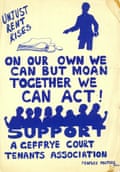My friend Mick Hugo, who has died aged 73, was active in the squatters movement of the early 1970s and helped to set up the Hackney Housing Co-Operative, which has provided homes in London for hundreds of people over the years.
Born in the Hoxton area of Hackney to Florence (nee Bartrip), a dressmaker, and her husband, James Hugo, a demolition worker, Mick went to Shoreditch secondary school and joined the merchant navy in 1961 aged 15, mainly to avoid the temptation of drifting into crime, as many of his friends had done.
He remained at sea until 1972, coming back to shore having been politicised in part by the injustices he witnessed at work but also by having met, during the 1966 seamen’s strike, an American youth worker, Glenn Thompson, and his partner, Margaret Gosley, at the Hoxton Cafe project.
When Glenn and Margaret opened Centerprise, a radical bookshop and youth and community project in Dalston in the early 70s, Mick was a key volunteer there, and it was at Centerprise that he and I met.

Thereafter Mick also became involved in fair rent campaigns and the squatting movement in Hackney – and was a founding member in 1976, along with figures such as John Goldenberg, Valerie Belton, Terry Bednall and John Pipal, of the Hackney Housing Co-op. He remained one of its key members for the next 30 years, and lived in one of the co-op’s flats in London Fields for the rest of his life.
Outside of his housing activities Mick was a self-employed builder, as well as a painter and decorator. He was also a self-taught painter, sculptor and illustrator, and channelled his talent into designing posters for local housing and anti-fascist campaigns.
He was a founding member in 1988 of Unity Pétanque club in Hackney, which provided players to represent Britain in world championships and established a home on London Fields, where the piste [playing area] still exists, even though the club itself disbanded after a decade or so. In 2016 Mick’s reflections on his time in the merchant navy were published in a critically acclaimed book, Skinning Out – to Sea, which was illustrated with his own drawings. Beautifully presented, it was set in Doves Type, a typeface famously recovered from the Thames riverbed in 2015. Its launch at Broadway Bookshop in Hackney was a great affair, with Mick vividly recalling the sea-going days that had formed him.
Mick’s first marriage, to Penny Thomas, ended in divorce. His second wife, Val Towers, died in 1999, and in his last years he entered into a happy relationship with Pat Cochrane, a freelance arts consultant whom he met through family connections.
He is survived by Pat, by two daughters, Jane, from his first marriage, and Kate from his second, a stepson, Joe, and his sister, Pauline.
